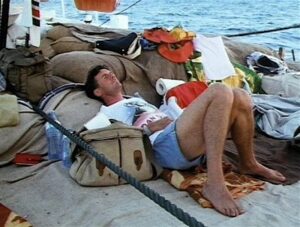- Are radically fewer people watching the Olympics this year?
The simple answer is no. The more complex answer is, “What do you mean by watching?” As University of Main media historian Dr. Michael Socolow writes today in Slate, obviously the traditional television ratings for the Beijing Olympics on NBC and related television networks are way down. But millions more people are watching Olympic videos through YouTube and TikTok. And when you combine all the viewership of NBC-produced video, you are seeing record-breaking audience sizes. This all goes back to the question I ask my students every semester: What does it mean to say you are “watching television”? (Click image below for video)
- Why has ViacomCBS changed its name to Paramount?
The simple answer is, “Why not? Everyone knows who Paramount is.” The more complex answer is: Given that most of my media literacy students have never heard of Viacom before enrolling in my class, it’s no surprise that the broadcast/cable/movie giant is taking on Paramount as its brand name.Viacom got its start as a production company run by CBS back in the 1960s, but the broadcast company was forced to spin Viacom off in 1971 because it was too much power in the hand of one company (isn’t that quaint!). Viacom was then bought in 1987 by movie theater owner Sumner Redstone, who added Paramount Studios to his portfolio. And then, given the big changes in the FCC’s feelings about ownership, Viacom bought out CBS. They danced around having separate stock for several years, and then, in 2019, following an extended and rather ugly battle among management and members of the Redstone family, the two companies came back together with the rather awkward name ViacomCBS. So the new name not only makes the company more identifiable, it also helps put the internal battles for control of the company into the past. - Why did Sarah Palin lose her libel suit against the NY Times?
 The simple answer is that Palin never had a case. The more complex answer is that both the judge and the jury ruled that the former Alaska governor and Republican vice presidential candidate had not demonstrated the high legal status of “actual malice” that public figures are required to meet. The NY Times did print a false statement in an editorial that was relatively quickly corrected. And Palin was unable to show that she had really been harmed by the quickly corrected error.
The simple answer is that Palin never had a case. The more complex answer is that both the judge and the jury ruled that the former Alaska governor and Republican vice presidential candidate had not demonstrated the high legal status of “actual malice” that public figures are required to meet. The NY Times did print a false statement in an editorial that was relatively quickly corrected. And Palin was unable to show that she had really been harmed by the quickly corrected error.
And finally…
- Has there ever been a more perfect hour of low-key television than Micahel Palin crossing from Dubai to Bombay on a dhow on his Around the World in 80 Days travel show?
 The simple answer is “no.” There is no complex answer.The show aired on the BBC back in 1988 and not long afterward on PBS. I saw the series when it first aired in the United States, and I can’t tell you how many times I’ve managed to watch the TV series or listen to the audiobook since then. Palin’s challenge was to make it around the world in 80 days or less without the use of modern air travel.The people he meets and the experiences he has (including being shaved by a blind barber in India) all unroll at an unhurried pace of another era. Palin is accompanied on his travels by a small film crew he refers to as his Passepartout (the valet for Jules Verne’s original hero Philias Fogg).
The simple answer is “no.” There is no complex answer.The show aired on the BBC back in 1988 and not long afterward on PBS. I saw the series when it first aired in the United States, and I can’t tell you how many times I’ve managed to watch the TV series or listen to the audiobook since then. Palin’s challenge was to make it around the world in 80 days or less without the use of modern air travel.The people he meets and the experiences he has (including being shaved by a blind barber in India) all unroll at an unhurried pace of another era. Palin is accompanied on his travels by a small film crew he refers to as his Passepartout (the valet for Jules Verne’s original hero Philias Fogg).
The best episode of the series is where Palin has to cross the Persian Gulf on an old-school regional cargo boat (a dhow) that runs on a diesel engine supplemented by a sail when feasible. During his eight-day crossing, Palin connects with perhaps the purest part of his entire journey. He has only an open deck with a tarp cover for accommodations, and the toilet is an open seat over the sea. (Note: All is not well with Palin’s stomach for several days.) The journey across the Persian Gulf was slow, it could be scary at times, and it was often incredibly dull. But Palin writes that it was the part of the trip he will never forget. There’s no official way to see the series in the US anymore, but you can find a reasonably good copy of the series on the Internet Archive. It’s worth digging up.
P.S. PBS is currently showing a reimagined version of Jules Verne’s Around the World in 80 Days that has been absolutely excellent, staring British actor David Tennant as Fogg, French actor Ibrahim Koma as Passepartout, and German actress Leonie Benesch (from Babylon Berlin) as journalist Abigail “Fix” Fortescue. Highly recommend getting caught up on it if you have access to PBS Passport streaming.

